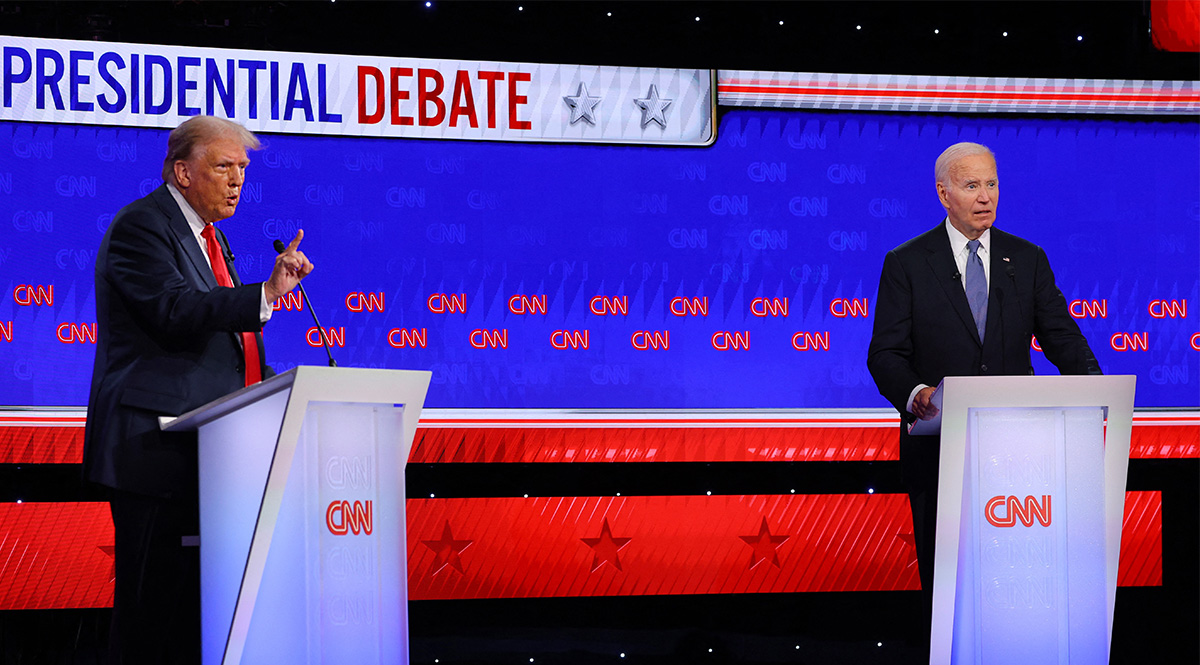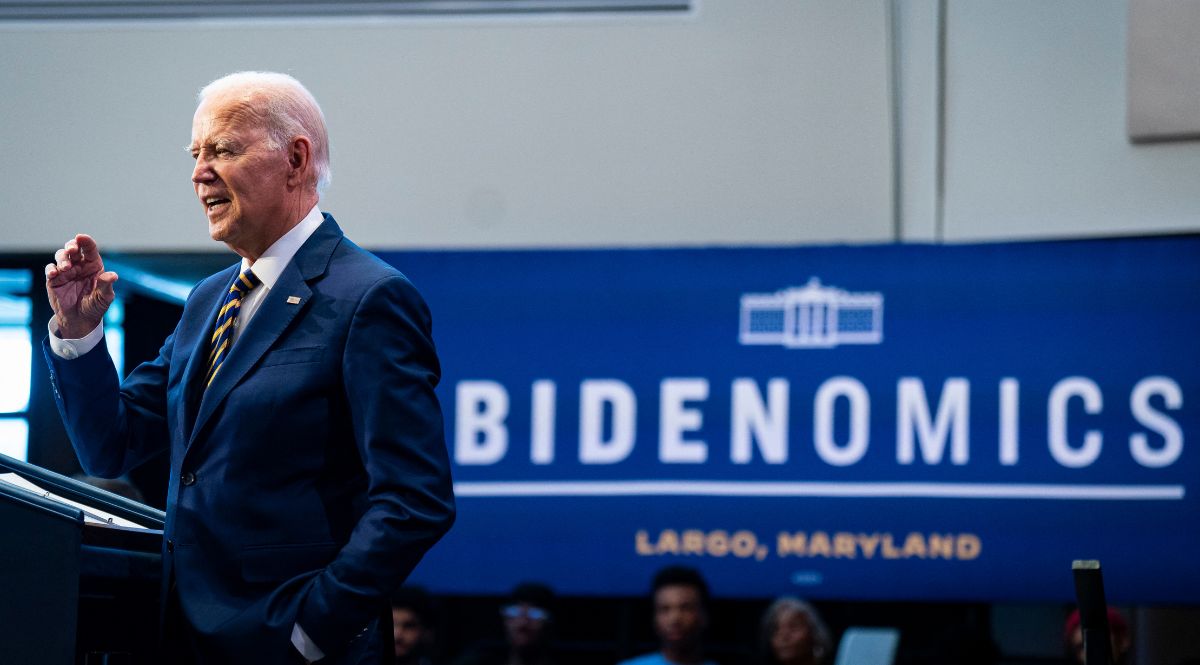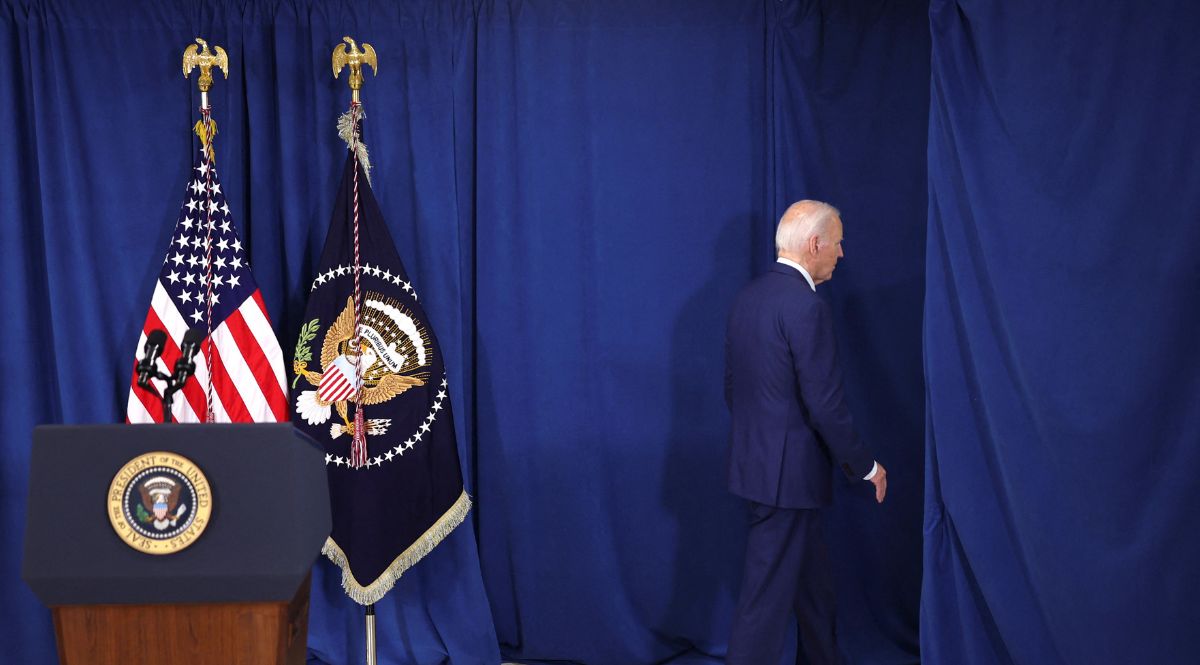Harris Boosts Democrats' Chances in the U.S. Presidential Election
Joe Biden’s withdrawal from the campaign for re-election and the Democratic Party’s selection of Kamala Harris as its presidential nominee increase the chances that Donald Trump will be defeated in the November elections. The change does not solve the political problems facing the Democrats, led by negative assessments of the economy and irregular immigration. However, the slogans accompanying Harris, including on women’s rights, may offset the unpopularity of some of the Biden administration’s policies. Harris’ candidacy will also have a mobilising effect on Democratic Party supporters and some independent voters.
 Elizabeth Frantz / Reuters / Forum
Elizabeth Frantz / Reuters / Forum
On 21 July, Biden announced that he would no longer seek re-election in the November's presidential election. He made the decision after intense media coverage and pressure from donors and key Democratic Party politicians after a poor performance in the first of several scheduled presidential debates. The Democrats, though, managed to raise a new candidate without any tensions. After Biden stepped down, Vice President Harris immediately announced her intention to seek the nomination, and her potential challengers quickly endorsed her, limiting intra-party competition. Within two days of Biden’s withdrawal, Harris secured the support of enough delegates to the party convention to secure the nomination. This allowed her to focus on competing with Trump and carry out changes in the Democrats’ presidential campaign.
Voter Mobilisation
Harris’ candidacy has fired up the Democratic electorate’s optimism about their chances in the elections and is mobilising them to get involved in the campaign. Nearly 8 in 10 Democratic Party voters support Harris’ nomination as their presidential candidate. This stands in contrast to Biden, who was supported by 4 in 10 Democrats after the debate. During the first week and a half of July alone, since the start of the campaign with Harris at the helm, her staff and the Democratic committee raised a total of $310 million, including $81 million in the first 24 hours, setting a record for U.S. election campaigns. As much as 66% of the contributions came from first-time donors in this election cycle. Enthusiasm was also evident in volunteer applications, with as many as 370,000 new people nationwide expressing their willingness to make a commitment to the campaign within two weeks, including several thousand each in the key states of Arizona, Georgia, and North Carolina.
At the same time, polls in “swing” states, where the number of independents can change the vote, suggest that Harris has a better chance against Trump than Biden after the debate. In a Bloomberg poll, she had gained a 2% lead in Arizona and Nevada (Biden was losing by 2% to Trump in those states), strengthened her lead in Michigan from 5% to 11%, and levelled with Trump in Georgia (Biden was losing by 1%). In North Carolina, she made up 1 percentage point to Trump (Biden was 3% down), while in Pennsylvania she narrowed his lead from 7% to 4%. She also maintained her party’s lead in Wisconsin (2%), although her result was 1% weaker than Biden’s. In practice, only the next opinion polls—conducted after her campaign started—will show whether the positive ratings in the initial polls were just a reaction to a new candidate and optimism, or Harris’ chances are indeed better than Biden’s of winning against Trump.
New Campaign Opening
Harris’ rise facilitates a new dynamic for the Democrats’ campaign for president. As a woman and racial minority, she can more effectively reach out to women and minorities with the party’s message while mobilising them to vote. She also has a better chance than Biden of winning the support of the young. The differences between her and Trump (gender, minority background, age) are more pronounced than Biden’s, which may make it easier to convince some independent voters to vote for her. In addition, Harris, as a more left-leaning politician than Biden, may alleviate the discontent of a portion of the party’s electorate—especially the Arab minority, American Jews, and young voters—with her promise to balance the U.S. approach to Israel and the war on Hamas.
Harris’ candidacy allows the campaign to focus on new topics. One of the key issues will be women’s rights. Attempts to restrict access to abortion at the state level after the Supreme Court overturned protections at the federal level in June 2022 have proven to be a political liability for Republicans. The issue is considered one of the main reasons they won fewer than expected seats for the House of Representatives and the Senate in November 2022 elections. Making reproductive rights one of the pillars of Harris’ campaign may make it easier to convince a larger group of voters, especially women from racial minorities, to support her candidacy. Currently, 63% of Americans support the legality of abortion in most cases (Pew Research Center), and 12% of voters indicate that access to abortion is the most important issue to them in terms of their vote (KFF). It is even more important to black women (28%) and those from states where abortion is banned (19%). This is overlaid by the Republicans’ desire to restrict the availability of in vitro fertilisation.
Another issue that Harris may emphasise in the campaign is Trump’s legal problems and that he was convicted in a criminal trial. As a former San Francisco district attorney and California attorney general, she has a lot of credibility in attacking the former president. It will also be easier to create a clear contrast between the candidates in Harris’ favour, which, in Biden’s case, was hampered by the accusations against his son. In June, after Trump’s conviction, 21% of independent voters surveyed said the guilty finding mattered to them and weakened their support for the Republican candidate (Politico).
Major Challenges
Biden’s replacement in the campaign has not pushed back the political issues facing the Democrats, primarily negative assessments of the economy and migration policy. The second area in particular will be exploited by Trump and Republicans in the campaign, as irregular immigration has increased under Biden’s presidency (there were 6 million irregular border crossings with Mexico between 2021 and 2023, three times more than between 2017 and 2020). Harris spearheaded negotiations with Mexico, Guatemala, Honduras, and El Salvador to limit migration from these countries to the U.S., but failed to achieve the desired result. In the Republicans’ view, this is a prime example of Harris’ failure in foreign and migration policy, which have direct implications for domestic security. Given the public’s low support for current migration policy—32% approve and 60% disapprove (Forbes)—and the high importance to voters on immigration—31% cited it as the second-most important issue for the U.S., just after inflation and high prices (Forbes)—it will be the most important campaign message for Republicans targeting Harris and Democrats.
Conclusions and Outlook
Harris’ candidacy has increased the chances of Democrats competing effectively in the autumn elections by mobilising the party’s electorate—similar to what happened to Republicans after Trump’s assassination attempt. However, the outcome of the election will be determined by the attractiveness of the candidates’ programmes to independent voters, especially from swing states. It will not be in Harris’ interest to cut herself off from the legacy of Biden’s presidency, as this would not be believable and could negatively affect the mobilisation of her own electorate. Instead, she will emphasise her own role in joint major achievements, such as the Bipartisan Infrastructure Law, the Inflation Reduction Act, and the CHIPS and Science Act. In addition, by promising more progressive policies than before, she will be able to focus on further expanding state healthcare coverage, as well as providing broader social welfare for the poor, including tax credits and handouts. She could also propose programmes to reimburse or cover some of the high cost of rental property, and even push for the creation of a federal housing program.
The increased prominence of women’s rights in the campaign and a greater focus on social policies aimed at the working middle class will boost Harris’ chances and divert attention away from topics that are difficult for Democrats, in particular voters’ assessments of the economy and irregular immigration. Crucial to Harris’ ultimate success, however, will be formulating a credible message and policy proposals on these issues. The greater contrast between Harris and Trump, as well as her greater credibility than Biden on policy adjustments, may help attract a new group of voters outside the Democratic electorate. Convincing voters from swing states to support Harris’ candidacy will be critical to her victory in November’s presidential election.





